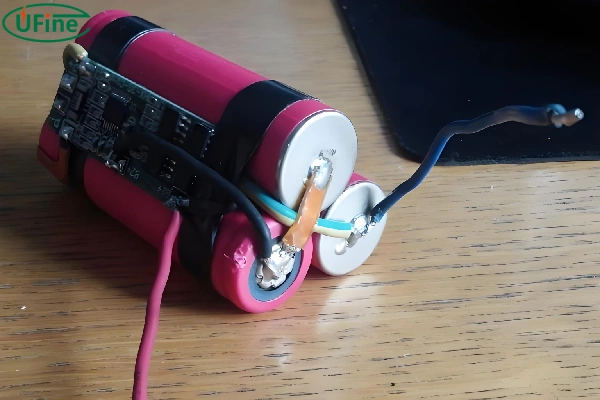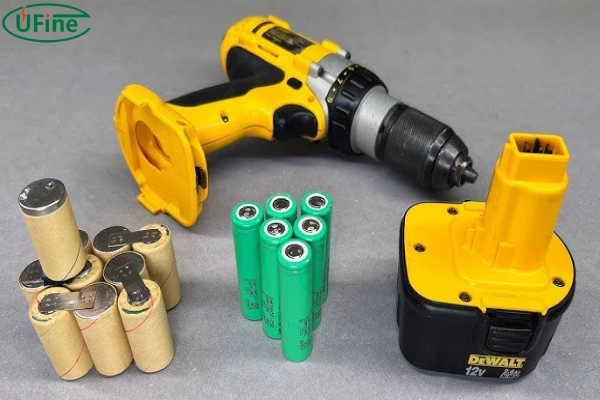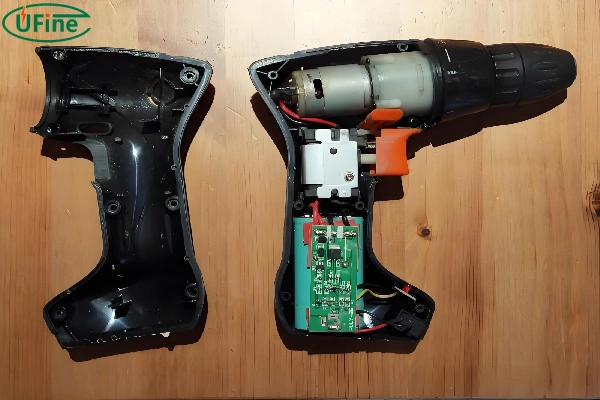If you’re still using a Ni-Cd battery in your drill, it might be time for an upgrade. The world of power tools is constantly evolving, and so are the batteries that power them. Lithium batteries offer many advantages over their Ni-Cd counterparts, making them the superior choice for modern drills. In this article, we’ll explore the different types of drill batteries, compare their features, and explain why you should consider making the switch to a lithium battery. We’ll also provide tips on how to choose the best lithium battery for your drill and how to replace your old Ni-Cd battery with a new lithium battery.

Part 1. Drill battery types
When it comes to powering your drill, there are several types of batteries available.
The most common types are:
- Nickel-Cadmium (Ni-Cd) Batteries: These are the traditional drill batteries. They are known for their durability and ability to deliver high power. However, they are also heavy, suffer from the memory effect, and have a shorter lifespan compared to newer battery types.
- Nickel-Metal Hydride (Ni-MH) Batteries: These batteries are an improvement over Ni-Cd batteries. They offer a higher energy density, which means they can store more energy and are lighter. However, they still suffer from the memory effect, though to a lesser extent.
- Lithium-Ion (Li-Ion) Batteries: These are the most advanced batteries for drills. They offer the highest energy density, are lightweight, and do not suffer from the memory effect. They also have a longer lifespan and can deliver consistent power throughout their use.
Part 2. Drill battery comparison
Let’s take a closer look at how these batteries compare across several key features:
- Energy Density: Lithium-ion batteries have the highest energy density. This means they can store more energy in a smaller and lighter package. Ni-MH batteries are in the middle, while Ni-Cd batteries have the lowest energy density.
- Weight: Lithium-ion batteries are the lightest, making your drill easier to handle and reducing fatigue during prolonged use. Ni-MH batteries are heavier than lithium-ion but lighter than Ni-Cd. Ni-Cd batteries are the heaviest.
- Memory Effect: This phenomenon reduces the battery’s capacity if it is repeatedly charged before being fully discharged. Ni-Cd batteries are highly susceptible to this, Ni-MH batteries are less affected, and lithium-ion batteries do not suffer from the memory effect at all.
- Lifespan: Lithium-ion batteries have the longest lifespan and are capable of enduring many more charge cycles than Ni-Cd or Ni-MH batteries. Ni-MH batteries have a medium lifespan, while Ni-Cd batteries have the shortest lifespan.
- Power Delivery: Lithium-ion batteries provide consistent power throughout their charge. Your drill will maintain its performance until the battery is completely drained. Ni-Cd and Ni-MH batteries can experience power drops as they discharge.
- Environmental Impact: Lithium-ion batteries are more environmentally friendly. They do not contain toxic metals like cadmium and are easier to recycle. Ni-Cd batteries contain cadmium, which is harmful to the environment, while Ni-MH batteries are less harmful but still not as green as lithium-ion.
- Cost: While lithium-ion batteries are more expensive upfront, their longer lifespan and better performance make them more cost-effective in the long run. Ni-MH batteries are moderately priced, and Ni-Cd batteries are the cheapest.
Part 3. Lithium battery advantages
Lithium batteries have several advantages over Ni-Cd and Ni-MH batteries. Here are some of the key benefits:
- Higher Energy Density: Lithium batteries can store more energy in a smaller and lighter package. This means your drill will be lighter and easier to handle.
- No Memory Effect: Unlike Ni-Cd and Ni-MH batteries, lithium batteries do not suffer from the memory effect. You can recharge them at any time without worrying about reducing their capacity.
- Longer Lifespan: Lithium batteries have a much longer lifespan. They can endure more charge cycles than Ni-Cd batteries, which means you’ll replace them less frequently.
- Consistent Power Delivery: Lithium batteries provide consistent power throughout their charge. Your drill won’t slow down as the battery drains, ensuring optimal performance.
- Environmental Friendliness: Lithium batteries are less harmful to the environment. They do not contain toxic metals like cadmium, and they are easier to recycle.
Part 4. Why should you choose drill lithium battery?
Switching to a lithium battery for your drill offers numerous benefits:
- Improved Performance: Lithium batteries provide consistent power, which means your drill will perform at its best until the battery is fully depleted.
- Lighter Weight: The lighter weight of lithium batteries makes your drill easier to handle, reducing fatigue during extended use.
- Longer Runtime: With a higher energy density, lithium batteries offer a longer runtime, allowing you to work longer without needing to recharge.
- Less Maintenance: No memory effect means less hassle with charging routines. You can charge your lithium battery whenever it’s convenient without worrying about diminishing its capacity.
- Cost-Effective: Although lithium batteries are more expensive up front, their longer lifespan and better performance make them a more cost-effective choice in the long run.
Part 5. How to choose drill lithium battery?
When choosing a lithium battery for your drill, consider the following factors:
- Voltage: Make sure the voltage of the lithium battery matches the voltage required by your drill. Common voltages for drills are 12V, 18V, and 20V.
- Capacity (Ah): The capacity of the battery, measured in ampere-hours (Ah), determines how long the battery will last on a single charge. Higher capacity batteries will provide a longer runtime.
- Brand Compatibility: Ensure the battery is compatible with your drill’s brand and model. Some manufacturers design their batteries to work only with their tools.
- Charger: Check if the battery comes with a charger or if you need to purchase one separately. Some chargers are designed to work with multiple battery types and brands.
- Price: Compare prices from different brands and retailers. While lithium batteries are generally more expensive, investing in a quality battery can save you money in the long term.
Part 6. How to replace your drill battery with a lithium battery
Replacing your drill’s Ni-Cd battery with a lithium battery is a straightforward process, but there are a few steps to ensure compatibility and safety:
- Check Compatibility: First, make sure the lithium battery is compatible with your drill. Look for batteries specifically designed for your drill model, or check the manufacturer’s recommendations.
- Choose the Right Voltage: Match the voltage of the lithium battery to the voltage of your drill. Using the wrong voltage can damage your drill or the battery.
- Purchase a Lithium Battery Charger: Lithium batteries require a charger different from Ni-Cd batteries. Ensure you have a compatible lithium battery charger.
- Remove the Old Battery: Take out the Ni-Cd battery from your drill. This usually involves pressing a release button or unscrewing a compartment.
- Insert the Lithium Battery: Place the lithium battery into the drill’s battery compartment. Make sure it fits securely and connects properly.
- Charge the New Battery: Before using the lithium battery for the first time, fully charge it using the compatible charger. This ensures optimal performance and longevity.
Part 7. Conclusion
Switching from Ni-Cd to lithium batteries for your drill is a smart decision that offers numerous benefits. Lithium batteries provide better performance, longer runtime, and greater convenience. They are lighter, more environmentally friendly, and cost-effective in the long run. By understanding the different types of drill batteries and considering the factors mentioned above, you can make an informed choice that will enhance your drilling experience and make your projects more efficient. So, if you haven’t already, it’s time to upgrade your drill with a lithium battery and enjoy the many advantages it offers.
Related Tags:
More Articles

How to Choose the Best Floor Scrubber Battery for Commercial Cleaning?
Selecting the ideal floor scrubber battery ensures a long runtime, rapid charging, and minimal maintenance for efficient commercial cleaning operations.
Battery for Blower vs Battery for Leaf Vacuum: Which One Should You Choose?
Battery for blower vs leaf vacuum—learn the key differences in power, fit, and runtime to choose the right battery for your outdoor tool needs.
How to Choose the Right Battery for Blower?
Choosing the right blower battery? Consider voltage, capacity, chemistry & usage. This guide helps match the best battery for peak performance.
How to Choose the Best Insulated Battery Box for Lithium Batteries?
Choosing the Best Insulated Battery Box for Lithium Batteries? Discover key factors such as size, material, and safety for optimal protection and performance.
7 Critical Elements on a Lithium Battery Shipping Label
What must be on a lithium battery shipping label? Learn 7 key elements to ensure safety, legal compliance, and correct handling across all transport modes.






